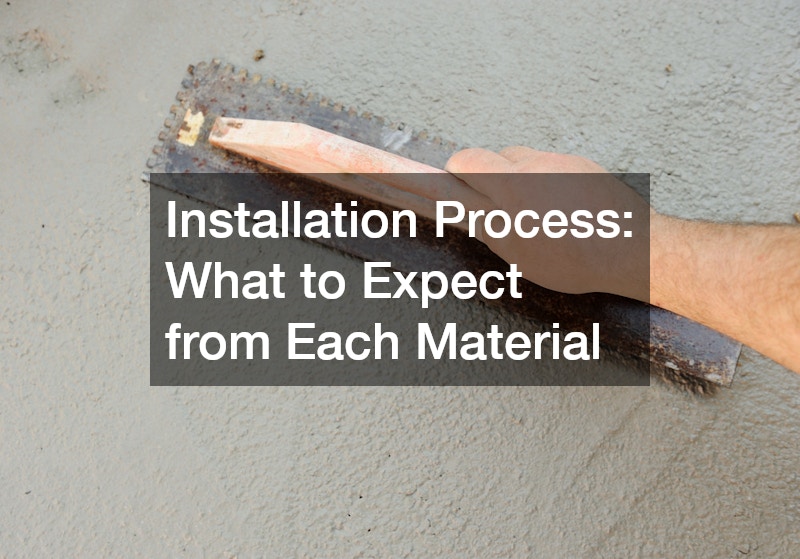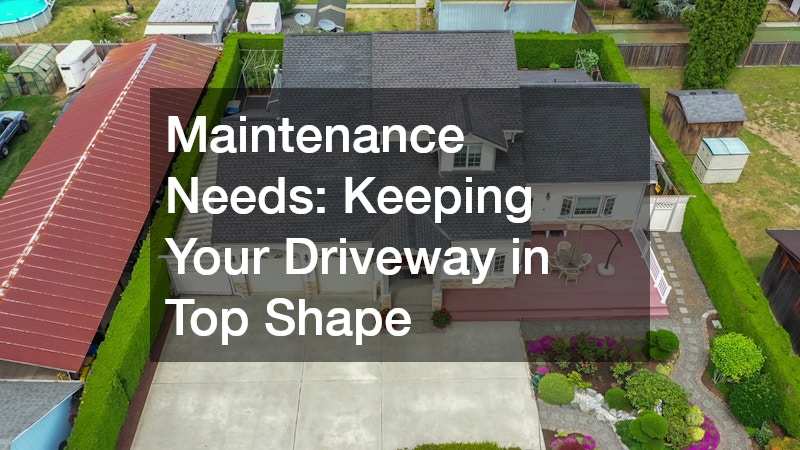Choosing the right driveway material is a bigger deal than it seems. Sure, it’s “just the driveway,” but it’s also the first thing people see when they pull up to your home—and one of the hardest-working parts of your property. Between sun, rain, cars, and the occasional basketball game, your driveway takes a beating year after year.
The two most common materials are asphalt and concrete, and both have their loyal fans. Some swear by the sleek black look and flexibility of asphalt, while others prefer the clean, durable finish of concrete. But when it comes down to the big question—which one lasts longer?—the answer isn’t quite as simple as it sounds. Let’s break it all down.
1. Understanding the Basics: Asphalt and Concrete Explained
Before we dive into which type of driveway lasts longer, it’s worth taking a step back and going over a few paving basics. Understanding how asphalt and concrete are made—and how they behave over time—can help you make a smarter, longer-lasting choice for your home.
Asphalt driveways are made by mixing crushed stone, sand, and gravel with bitumen, a black, tar-like material derived from petroleum. When the mixture is heated and spread, it forms a smooth, flexible surface that can handle expansion and contraction caused by changing weather. That’s why asphalt is so popular for roads, parking lots, and residential driveways—it’s durable, forgiving, and relatively easy to repair.
Concrete driveways, on the other hand, use a blend of cement, sand, gravel, and water. Once poured, the mixture hardens into a strong, rigid surface capable of supporting heavy loads without bending or warping. Because of this strength, concrete is a go-to choice for homes in warmer or moderate climates and is often used for foundations, patios, and walkways as well.
If you want to visualize the main differences, think of it like this:
-
Asphalt = flexible and dark.
-
Concrete = rigid and light-colored.
Both materials have their own appeal—one offers flexibility and affordability, while the other delivers strength and longevity. But their unique properties also mean they respond differently to weather, use, and time. That’s exactly where the lifespan debate begins.
2. Installation Process: What to Expect from Each Material

The way your driveway is installed has a huge impact on how well it performs over the years. Even the most durable materials can fail early if the groundwork isn’t done right. That’s why working with experienced driveway paving contractors is so important—they know how to build a strong base, manage drainage, and apply each layer correctly to maximize your driveway’s lifespan.
Asphalt Installation
Asphalt installations are known for their speed and efficiency. The process starts with a stable foundation—typically compacted gravel or crushed stone—to support the top layer. Then comes the asphalt paving, where contractors pour and spread a hot mix of asphalt and aggregates evenly across the surface. Once the material is rolled and compacted, it begins to cool and harden within a few hours. In most cases, asphalt driveways can handle light traffic within one to two days, making them a great choice for homeowners who want minimal downtime.
Proper grading during installation is essential, too. It helps prevent water from pooling, which can cause early cracking or soft spots later on. A well-laid asphalt surface should feel smooth underfoot and drain efficiently during rain.
Concrete Installation
Concrete installation takes a bit more patience and precision. After the base is prepared, the wet concrete mixture is poured, leveled, and reinforced with rebar or wire mesh to boost strength and prevent cracking. Next comes the curing phase—a process that can’t be rushed. Concrete typically takes about a week to cure enough for vehicle use and up to a month to reach full hardness. The curing process allows the material to develop its long-term durability and resistance to wear.
For decorative finishes or colored concrete, installers may apply sealers or surface treatments once the slab has set, adding both protection and style.
Installation Time Comparison
-
Asphalt: 1–2 days of work + 1–2 days to set.
-
Concrete: 2–3 days of work + 7+ days to cure.
While asphalt is the quicker option, both materials require skilled installation for best results. Cutting corners—like skipping compaction or ignoring slope—can lead to cracks, puddles, and premature wear no matter which surface you choose. Investing in proper installation from qualified professionals pays off for decades.
3. Durability and Lifespan: How Long Do They Really Last?
Now we get to the big question every homeowner asks: which driveway actually lasts longer? The short answer—it depends on the material, your local climate, and how well you take care of it. But generally speaking, concrete tends to edge out asphalt in terms of overall longevity.
On average, asphalt driveways last around 20 to 30 years when properly maintained. Concrete driveways, on the other hand, can last 30 to 50 years or more. That’s a significant difference, though both can serve you well if installed and maintained correctly.
Durability largely comes down to how each material reacts to stress and the elements. Asphalt is naturally flexible, which allows it to expand and contract with ground movement or temperature changes without cracking right away. That flexibility is why paving companies often recommend asphalt for regions that experience frequent freeze-thaw cycles. However, asphalt’s softer nature also makes it more vulnerable to heat, sunlight, and heavy loads. Without regular sealing, the surface can oxidize, turn gray, and eventually develop cracks or potholes.
Concrete, by contrast, is much more rigid and dense. It’s built to handle substantial weight without deforming, making it ideal for households with multiple vehicles or heavy equipment. The trade-off? Concrete doesn’t handle ground movement as well. When the soil underneath shifts or when moisture freezes and expands, the surface can crack. Still, when properly installed by professional concrete services—with a strong sub-base, control joints, and quality materials—concrete often outlasts asphalt by decades.
Quick durability breakdown:
-
Asphalt: Flexible, shorter lifespan, easier and cheaper to repair.
-
Concrete: Rigid, longer lifespan, more resistant to wear and heat.
In the end, both materials can stand the test of time, but their durability depends as much on installation quality and maintenance habits as on the material itself. A driveway that’s built right from the start will always outperform one that’s rushed or poorly maintained.
4. Maintenance Needs: Keeping Your Driveway in Top Shape

Even the most durable driveway needs regular care to stay smooth, safe, and attractive. Neglecting maintenance can lead to cracks, fading, and costly repairs down the road. The good news is that both asphalt and concrete can last for decades if you follow a consistent upkeep routine.
Asphalt Driveway Maintenance
Asphalt driveways demand a little more attention, but they’re also more forgiving when it comes to DIY repairs. Every 3 to 5 years, experts recommend applying a sealcoat—a protective layer that shields your driveway from UV rays, water, oil stains, and chemical damage. Sealcoating keeps the asphalt flexible and dark, preventing it from drying out or becoming brittle.
Other simple maintenance steps include:
-
Filling cracks and potholes early before they spread.
-
Keeping the edges trimmed to prevent crumbling.
-
Avoiding heavy vehicles parked in the same spot for long periods.
You can hire asphalt paving contractors to handle professional sealing and crack repairs, ensuring the job is done evenly and effectively. With consistent upkeep, an asphalt driveway can last 25–30 years or more while maintaining that sleek, black finish.
Concrete Driveway Maintenance
Concrete is generally lower maintenance than asphalt, but it’s not completely hands-off. Instead of frequent sealcoating, concrete driveways benefit from joint sealing, surface cleaning, and occasional resurfacing to prevent cracking and staining. Over time, exposure to moisture, oil, and deicing salts can dull or damage the surface if not treated.
Some easy concrete care tips include:
-
Cleaning stains and spills as soon as possible, especially from oil or grease.
-
Resealing every few years to create a water-resistant barrier.
-
Filling small cracks early before they expand.
For best results, homeowners often rely on concrete sealing companies that specialize in applying long-lasting sealers and rejuvenating worn surfaces. They use professional-grade products that penetrate deep into the material, protecting it from weather and wear. If the surface becomes uneven or dull, resurfacing with a thin overlay can restore the driveway’s original look without needing a full replacement.
In short, asphalt requires more frequent maintenance but simpler fixes, while concrete calls for less frequent care but more specialized attention. Either way, investing in regular upkeep helps you avoid major repairs and keeps your driveway looking brand new for years.
5. Weather Resistance: Which Performs Better in Extreme Conditions?
Your local climate can make or break your driveway—literally. Both asphalt and concrete react differently to temperature extremes, moisture, and seasonal changes.
Cold Climates
If you live in a region with harsh winters, asphalt driveways generally perform better. Asphalt’s natural flexibility allows it to expand and contract with freeze-thaw cycles, helping prevent cracks. Concrete, on the other hand, can become brittle and prone to surface flaking or cracking when repeatedly exposed to freezing temperatures and road salt.
However, homeowners aren’t out of options. When cracks or uneven areas appear in a concrete driveway, concrete mudjacking companies can lift and level the slab without the need for a full replacement—a cost-effective solution for winter damage repair.
Hot Climates
In hotter regions, concrete often has the upper hand. Asphalt can soften in extreme heat, leading to depressions where vehicles are parked or driven frequently. Concrete reflects more sunlight, keeping surface temperatures lower and helping the material maintain its integrity longer.
Rain and Drainage
Moisture management is key for both materials. Asphalt naturally repels water, encouraging runoff, but standing water can still weaken its base if not properly drained. Concrete is more porous, meaning it can absorb water that later freezes and expands, causing cracks.
A well-designed drainage system—complete with proper grading, sloping, or nearby trench drains—helps prevent these issues. Some homeowners also consider permeable paving options that allow water to drain through the surface, reducing runoff and erosion.
6. Cost Over Time: Initial Investment vs. Long-Term Value

Let’s talk money—because cost plays a big part in any driveway decision.
Installation Costs
Asphalt driveways are generally cheaper to install, averaging around $4–$8 per square foot, while concrete ranges from $8–$15 per square foot, depending on finishes and reinforcement.
If you’re on a tighter budget and need something functional fast, asphalt is the go-to option.
Long-Term Value
However, when you factor in maintenance and lifespan, concrete starts to look more appealing. You’ll spend less on repairs and won’t have to reseal as often. Concrete also adds more to your home’s curb appeal and resale value, especially if you choose decorative finishes.
Here’s a quick comparison:
|
Factor |
Asphalt |
Concrete |
|
Initial Cost |
Lower |
Higher |
|
Maintenance |
More frequent |
Less frequent |
|
Lifespan |
20–30 years |
30–50 years |
|
Repair Cost |
Lower |
Higher |
|
Aesthetic Options |
Limited |
Many (stamps, colors, textures) |
When you spread the costs out over decades, both can offer solid value—it really depends on what matters more: upfront savings or long-term durability.
7. Aesthetic Appeal and Customization Options

Let’s face it—curb appeal matters. Your driveway isn’t just a functional surface; it’s one of the first things people notice about your home. The right material can either complement your landscape or become a standout design feature.
Asphalt Appearance
Freshly laid asphalt offers a sleek, deep-black finish that gives your property a clean and modern look. Over time, however, it naturally fades to gray due to sun exposure and weathering. While regular sealcoating helps restore its color, asphalt doesn’t offer much in terms of design flexibility. To boost visual appeal, some homeowners pair asphalt with decorative elements such as stone borders, brick edging, or even a stamped concrete apron for contrast and texture.
Concrete Appearance
Concrete, on the other hand, opens the door to nearly endless customization. Homeowners can work with a stamped concrete contractor to create unique patterns that resemble cobblestone, flagstone, or even wood planks—giving the driveway a high-end, handcrafted look. For added character and depth, professional concrete staining can be applied to achieve rich tones that mimic natural stone or complement the home’s exterior palette.
Customization ideas for concrete include:
-
Stamped patterns like slate, brick, or geometric designs.
-
Multi-color staining to highlight texture and dimension.
-
Exposed aggregate for a decorative, slip-resistant finish.
-
Smooth, tinted concrete for a modern minimalist appeal.
While asphalt delivers simplicity and uniformity, concrete wins in the creativity department—perfect for homeowners who want their driveway to make a statement.
8. Making the Right Choice for Your Home
So, which driveway lasts longer—asphalt or concrete?
If we’re talking purely about lifespan, concrete takes the win. It can last decades longer if properly installed and maintained. But longevity isn’t everything. Asphalt is cheaper, faster to install, and easier to repair, making it a practical favorite for many homeowners.
Here’s how to decide what’s best for you:
-
Choose asphalt if:
-
You live in a cold or moderate climate.
-
You prefer lower upfront costs.
-
You don’t mind resealing every few years.
-
You like the classic, dark driveway look.
-
-
Choose concrete if:
-
You want a longer-lasting surface.
-
You live in a warm or mild climate.
-
You value aesthetics and customization.
-
You’re okay with a higher initial cost.
-
Bonus tip: If you already have an old driveway that’s seen better days, you don’t always need a full replacement. Consider resurfacing—a process where a new layer of asphalt or concrete is applied over the old base. It’s faster, cheaper, and can add 10–15 more years to your driveway’s life.
The Bottom Line
At the end of the day, there’s no one-size-fits-all answer. Both asphalt and concrete can go the distance if installed and maintained properly. What really matters is your budget, climate, and personal style.
If you love a clean, bright look that can last half a century, concrete is worth the investment. But if you want something affordable, quick, and easy to repair, asphalt might be the smarter move.
Whatever you choose, remember: a driveway isn’t just a path to your garage—it’s an extension of your home. With the right care (think sealing, resurfacing, and drainage), your driveway can stay strong, smooth, and beautiful for years to come.



